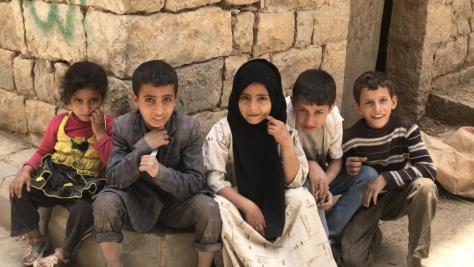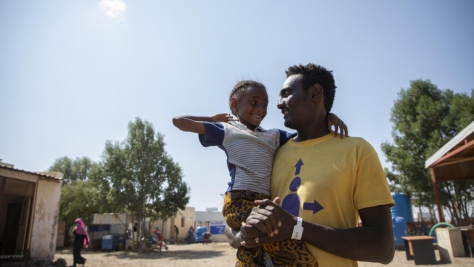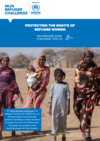Ethiopia: Somali refugees to be relocated away from border
This is a summary of what was said by UNHCR spokesperson Jennifer Pagonis – to whom quoted text may be attributed – at today's press briefing at the Palais des Nations in Geneva.
In Ethiopia today (Friday), UNHCR teams are expected to start relocating a group of 500 newly-recognized Somali refugees who fled from renewed conflict in strife-torn south and central Somalia over the last year. They have been staying around the Kebribeyah area, near the Somali border in eastern Ethiopia and are being relocated to a re-opened UNHCR camp at Teferi Ber.
The refugees are part of a group of 4,000 Somali refugees who have recently been granted refugee status by UNHCR and the government's Authority for Refugees and Returnees Affairs (ARRA). An estimated 7,000 additional Somalis who also claim to have fled fighting and insecurity in Somalia, are waiting to be screened at other sites in eastern Ethiopia.
The new camp site at Teferi Ber, some 120 km north of Kebribeyah, was formerly a UNHCR camp which in the 1990s hosted some 49,000 mainly Somalis refugees who had fled fighting in their country. The camp was officially closed in 2001 after all the refugees returned, mainly to the self -declared republic of Somaliland.
After arriving at Teferi Ber, the refugees will spend three days in a reception centre where they will be allocated plots of land to construct homes and given building materials. They will also be given food as well as tarpaulins, blankets, sleeping mats, kitchen sets, jerry cans, kerosene stoves, and soap. The ARRA has established a temporary health centre until permanent structures can be built.
The Somali Region of Ethiopia already hosts more than 16,500 refugees. With the new arrivals, the total is 20,300. At the peak of the Somali refugee crisis in the early 90s, the region hosted 628,000 refugees in eight camps. The overwhelming majority went home between 1997 and 2005, and all of the camps were closed except a camp at Kebribeyah.
Related news and stories
Thousands of newly arrived Somali refugees in Ethiopia relocated to new settlement
Samira's Story
Drought brings life-threatening food shortages for refugees in Ethiopia
100,000 new Somali refugees arrive in Ethiopia in the past month, UN and partners are calling for urgent funding
UNHCR teams and partners rush assistance to some 100,000 newly arrived Somali refugees in hard-to-reach area of Ethiopia
As the Horn of Africa drought enters a sixth failed rainy season, UNHCR calls for urgent assistance
-

Discussion Papers 1- 4 UNHCR's Engagement in Humanitarian-Development Cooperation
Dec 2020 Cooperation with development organizations has long been part of UNHCR's approach to building long-term support and finding durable solutions for people forced to flee. Over the past few years, UNHCR's cooperation has both widened and deepened by engaging with global entities like the World Bank, regional entities like the African Development Bank, and development donors. These four papers explore how UNHCR can further cooperate with development actors and strengthen – what we often refer to as – the humanitarian-development nexus. -

Evaluation of UNHCR's Approach to Learning and Development for Workforce and Partners
Dec 2020 This centralised evaluation takes a holistic look at workforce learning and development (L&D) within UNHCR. Making use of desk reviews, mapping of L&D in other agencies, key informant interviews, a staff survey, and numerous validation workshops; the evaluation proposes recommendations at the strategic and practical levels for strengthening UNHCRs approach and delivery of learning and development. Attachments: Annex: ES/2020/11 Management Response and Executive Summary (.zip) -

Nearly 40 million at heightened risk of violence, discrimination and rights abuses as COVID spawns a 'coping crisis'
30 Nov 2020 Study reveals a severe deterioration in international efforts to protect the world's most vulnerable, with human rights violations on the rise. -

'Climate change is the defining crisis of our time and it particularly impacts the displaced'
30 Nov 2020 UNHCR's Special Advisor on Climate Action, Andrew Harper, outlines how global warming is driving displacement, and why decisive action is vital now. -

Mid-Year Trends 2020
30 Nov 2020 -

UN refugee chief appeals for funds to help refugees fleeing Ethiopia's Tigray to Sudan
30 Nov 2020 -

Climate Change / Forced Displacement - a dangerous crossing
30 Nov 2020 -

UNHCR chief calls for support for Sudan as it hosts Ethiopia refugees
29 Nov 2020 Filippo Grandi also launches an appeal for nearly US$150 million to help the government of Sudan look after the refugees. -

Protecting the rights of refugee women
27 Nov 2020
